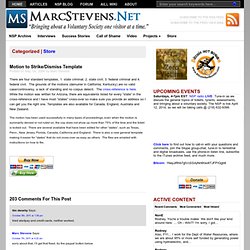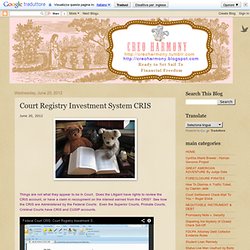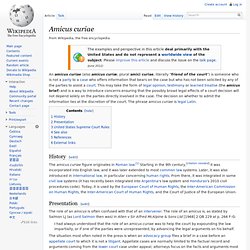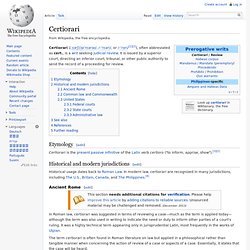

Motion to Strike/Dismiss Template. Motion to Strike/Dismiss Template Posted on May 1st, 2006 by Marc Stevens There are four standard templates, 1. state criminal; 2. state civil; 3. federal criminal and 4. federal civil.

The grounds of the motions (demurrer in California, Kentucky) are no valid case/controversy, a lack of standing and no corpus delecti. The cross-reference is here. Dispelling the Myths About Your Miranda Rights. Myth: You can waive your Miranda rights.

They try to slip you this one, too. "Do you understand these rights as they have been read to you? And do you wish to waive these rights? " But it's another fallacy, and you'll be glad once you understand it that it can only be a fallacy. "We hold these truths to be self-evident, that all men are created equal, that they are endowed by their Creator with certain unalienable Rights... " - Thomas Jefferson, the Declaration of Independence Most federal citizens are familiar with that passage. Similarly, they had to baffle people on the nature of rights as being intrinsic. But this was politically inconvenient, and so they made a one-letter alteration. Five things your attorney won't tell you. Law has to do with authority, justly expressed and in harmony with a greater authority.

Legal, legislation, and legalism come from "legis". They're terms of bureaucracy. Today most people think that if there's a piece of legislation or a court ruling, it's automatically valid law. Not so! If all the forms are dated, signed by the right parties, sent in on time to the right people, then you have legality. In the U.S., the government was created by the People, and the People delegated a small amount of limited authorities to the government. Legal is defined as something which "has the form and appearance of law, without necessarily having the substance of it".
Court Registry Investment System CRIS. June 20, 2012 Things are not what they appear to be in Court.

Does the Litigant have rights to review the CRIS account, or have a claim in recoupment on the interest earned from the CRIS? See how the CRIS are Administered by the Federal Courts. Even the Superior Courts, Probate Courts, Criminal Courts have CRIS and CUSIP accounts. Federal Court, Court Registry Investment System (the "CRIS")JP Morgan is involved with every case Reviewed Video Bankruptcy Court Tennessee CRIS 28 USC § 2041 - Deposit of moneys in pending or adjudicated cases Federal Court (by region) will have a different Administration location, for CRIS accounts. How To Dismiss A Traffic Ticket, by Captain Jade. Secret Weapon against Traffic Tickets estate beneficiary and general executor office Traffic Police, Cop and Courts, don't want you to know that the cases are constructive trusts, and that you have the right to be the beneficiary of that constructive trust (traffic court case).

The vast majority of contested tickets are dismissed or the defendant is given a significantly reduced penalty. We would love to hear what happened to your case when you invoke your common law and natural law rights under trust law. Amazing things will happen when you invoke common law and natural law rights Bond vs. James Madison show, with Mickey, Title: EPISODE266 - JamesMadison's Community Call-Mickey Time: 05/08/2012 , comments on the show re. traffic ticket and Captain jade discusses BRICS currency We wish all sentient live beings to be in harmony with earth and God Legal Disclaimer is found on the bottom of site. We wish that you find peace and financial freedom. Traffic_ticket_by_jade_multipage.tif.
09-1227 Bond v. United States (06/16/2011) Amicus curiae. History[edit] Presentation[edit] I had always understood that the role of an amicus curiae was to help the court by expounding the law impartially, or if one of the parties were unrepresented, by advancing the legal arguments on his behalf.

The situation most often noted in the press is when an advocacy group files a brief in a case before an appellate court to which it is not a litigant. Appellate cases are normally limited to the factual record and arguments coming from the lower court case under appeal; attorneys focus on the facts and arguments most favorable to their clients. Where a case may have broader implications, amicus curiae briefs are a way to introduce those concerns, so that the possibly broad legal effects of court decisions will not depend solely on the parties directly involved in the case. In prominent cases, amici curiae are generally organizations with sizable legal budgets. Certiorari. Certiorari (/ˌsɜrʃ(i)əˈrɛəraɪ/, /-ˈrɛəri/, or /-ˈrɑri/[1][2]), often abbreviated as cert., is a writ seeking judicial review.

It is issued by a superior court, directing an inferior court, tribunal, or other public authority to send the record of a proceeding for review. Etymology[edit] Certiorari is the present passive infinitive of the Latin verb certioro ("to inform, apprise, show").[3][2] Historical and modern jurisdictions[edit] Historical usage dates back to Roman Law. Ancient Rome[edit] In Roman law, certiorari was suggested in terms of reviewing a case—much as the term is applied today—although the term was also used in writing to indicate the need or duty to inform other parties of a court's ruling.
The term certiorari is often found in Roman literature on law but applied in a philosophical rather than tangible manner when concerning the action of review of a case or aspects of a case. Common law and Commonwealth[edit] United States[edit]